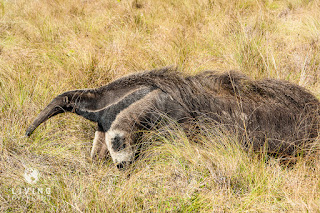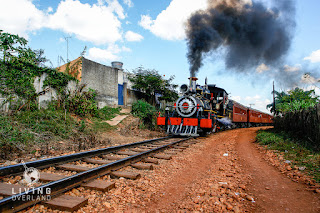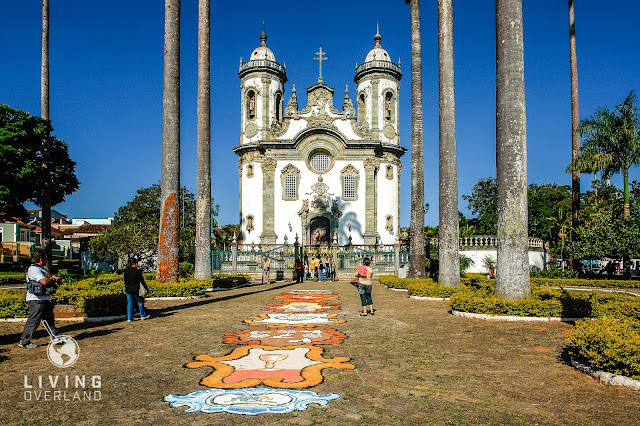Brazil's Top Five Overlanding Routes
Written by Karin-Marike Vis
Photos by Coen Wubbels
 |
| Exploring the Beach Along Brazil's Coast |
“Can you go there? Isn’t Brazil dangerous?”
Entering the vast countryside of Brazil, you’ll find space, emptiness, villages, national parks, and lots of friendly people. Locals are curious, helpful and hospitable. Invitations to join them on a weekend outing, for a barbecue, or to stay at their homes are not uncommon.
It took little for us to fall in love with the country. Returning five times and spending in total more than two years roaming the country, we have explored Brazil’s remotest corners.
Here are five overlanding routes worth checking out.
1. For the Wildlife Watchers – The Pantanal
An increasing number of overlanders are hopping across the eastern border of Bolivia to catch a glimpse of the Pantanal. And rightfully so. The biggest wetland in the world, the Pantanal is home to a wondrous number wild animals and, due to the flatness and openness of the region, spotting wildlife in South America doesn’t get any better than here.
Expect to see macaws, toucans, the jabiru (or tuiuiú, symbol of the Pantanal), coatis (a type of raccoon), capybaras (the largest rodent in the world), and caimans. Take your time to spot deer, wild boars, giant anteaters, and giant otters. The lucky ones will spot a jaguar as well.
 Routes
Routes
- On the south side runs the Estrada Parque, starting from the border town of Corumbá and ending roughly at Aquidauana.
- On the north side runs the Transpantaneira; starting southwest miles from Cuiabá, it cuts through the wetland from Poconé to Porto Jofre for 90 miles.
Practicalities
- Stock up on food, water, and fuel and prepare to be out there longer than expected. There is simply so much to see. And, of course, make sure your camera works and you have enough space to store your pictures!
- The best time of the year is June / September when it’s dry and animals gather around the diminishing water sources.
- Rough camping is no problem. You can also find accommodation varying from guesthouses to luxurious hotels, many of which can also organize trips for you, e.g. boat trips or night trips.
2. For the Adventurous – The Tarantula Road
There are various adventurous roads, the most famous being the Transamazônica and the BR319, but I’d like to mention a lesser-known road trip. There is no official route called the Tarantula Route but we give it that name because we saw so many tarantulas along the way.
 No matter all the stories about the destruction of the Amazon: the region holds a sense of magic. Vast, endless, impenetrable rainforest home to many indigenous people, among which an estimate 60 uncontacted tribes. Driving the Tarantula Road allows you to see both. The road cuts through pristine rainforest, however, and unfortunately, a lot of it roller coasts through a region where the forest has made way for ranches – not without reason the region is called the Arc of Deforestation. When we drove it, all was unpaved but, like so many roads in Brazil, asphalt is taking over.
No matter all the stories about the destruction of the Amazon: the region holds a sense of magic. Vast, endless, impenetrable rainforest home to many indigenous people, among which an estimate 60 uncontacted tribes. Driving the Tarantula Road allows you to see both. The road cuts through pristine rainforest, however, and unfortunately, a lot of it roller coasts through a region where the forest has made way for ranches – not without reason the region is called the Arc of Deforestation. When we drove it, all was unpaved but, like so many roads in Brazil, asphalt is taking over.The Route
It runs from Alta Floresta (Mato Grosso), via Porto Velho, to Guajará-Mirim in Rondônia (where you can cross into Bolivia). Depending on the maintenance when you’re driving there it may include some rickety bridges as well as two ferry crossings across the Juruena River and Rio Roosevelt (the latter may now have a bridge).Practicalities
- 4WD vehicles can drive this route throughout the year, but unless you’re on for some serious mud baths, it is definitely more interesting in the dry season (June-October). 2WD vehicles had the best stick to the dry season.
- You’ll pass through towns to stock up, but don’t expect one every day (depending on how much distance you cover).
- Finding places to rough camp isn’t that problematic although pieces of land may be fenced off. When you camp next to rivers, pick the dark waters over white water as dark water is more acid, which keeps mosquitoes and other insects at bay.
3. For the Culture Buffs – The Estrada Real
By far the best route for anybody who loves colonial towns and baroque-style churches is the Estrada Real. The route runs from Paraty on the south coast up to Diamantina. The entire route is paved and easy to drive. This is not about the driving but about visiting the towns along the way.
Take the old train in Tiradentes, check out the fabulous sculptures by Aleijadinho in Congonhas, visit an old mine or wander the cobbled streets of Ouro Prêto. In summer you can enjoy a fabulous outdoor concert given from the balconies in downtown Diamantina.
 Route
Route
On the far ends are Paraty (south) and Diamantina (north), but the concentration of beautiful towns is, roughly, from São João del Rei to Ouro Prêto.Practicalities
- You can rough camp along the way or stay in guesthouses in towns.
- Minas Gerais arguably has about the best food in Brazil, make sure to have some in restaurants in the countryside with buffet-style lunches that serve very basic, but delicious staples such as feijão and feijoada. Also try the soft, delicious queijo Minas (cheese).
4. For the beach lovers – The dunes and beaches in northeast Brazil
Taking a ferry from Camocin east and you’ll land on the beach. Here the road literally stops. Air down the tires and drive east as far as the beach allows you to, ending in Fortaleza. Expect to be crossing streams on hand-powered ferries, and rough camping on vast, lonely beaches. Throw in a kitesurfing course in Tatajuba and take time out in Jericoacoara, the most easy-going of all beach towns in Brazil.
 This route is best for small 4WD vehicles such as Land Cruisers and Land Rovers. The big trucks can drive here as well but expect to make more detours over asphalt because you can’t take those rickety ferries. I can’t be sure about 2WDs – surely driving on hard sand won’t be an issue but I’m not sure if you’ll not be stopped by a dune or two.
This route is best for small 4WD vehicles such as Land Cruisers and Land Rovers. The big trucks can drive here as well but expect to make more detours over asphalt because you can’t take those rickety ferries. I can’t be sure about 2WDs – surely driving on hard sand won’t be an issue but I’m not sure if you’ll not be stopped by a dune or two.Route
From Camocin to Fortaleza.Practicalities
- Bring a compressor to inflate your tires in case you do make a detour over asphalt in between stretches of beach.
- If you like seafood, you’ll find yourself in heaven with plenty of opportunities to eat in restaurants or small beach stalls.
- The route is drivable all year round but the best months are June-January (dry season).
5. For the Intrepid overlanders – Explore West Brazil
Arguably least known is west Brazil with guidebooks giving the region practically no attention whatsoever. Having spent there five months, however, we don’t understand why this is. Here is a region full of diversity, with lots to see and experience. Like the Estrada Real, this is not so much about driving but learning about the country.
 Among our highlights were:
Among our highlights were:- Better than anywhere else you get an idea of the lives of indigenous people, the world’s largest cultivators of corn, soya and cotton and the major tensions between those two.
- Sites to add to your list: check out the Utiariti Waterfall (guide needed), visit the indigenous community of Quatro Cachoeiras (guide needed, organize in Campo Novo de Parecis), visit MST communities around Campo Verde, enjoy outdoor adventure in Bom Jardim (similar to Bonito but without the crowds), check out rock paintings in Jaciara, and go hiking in the Ricardo Franco Mountain Range.
Routes
There is no specific route. We zigzagged and looped endlessly. Get out a map, highlight the places you want to go and connect the dots.Practicalities
- Rough camping isn’t evident as the land belongs to indigenous people or farmers. We often stayed at gas stations, as you will see trucks do. Many are mini towns with restaurants, showers, a hairdresser, a workshop, a car wash, and other facilities.
- Don’t expect anything but Portuguese to be spoken here. With enough towns, fueling and stocking up is no problem.
Enjoy the road and let us know which one you like best. Or do you have another favorite? Let us know in the comment section below!
___________________________
Author
 Freelance writer Karin-Marijke Vis, along with her partner Coen Wubbels, photographer, combine their love for adventure with work they enjoy. Sometimes described as being the ‘slowest overlanders in the world,’ they believe in making connections and staying in a place long enough to do so. In 2003 the couple purchased an antique BJ45 Land Cruiser and began a three-year trip from their home in the Netherlands to Asia. Terminally infected by the overland bug, they traveled in South America (9 years) and the Far East (2 years). Karin-Marijke and Coen are currently traveling in Russia. They’ve been published in car/4x4 and travel magazines around the world. Follow them on their website, Facebook, and Instagram.
Freelance writer Karin-Marijke Vis, along with her partner Coen Wubbels, photographer, combine their love for adventure with work they enjoy. Sometimes described as being the ‘slowest overlanders in the world,’ they believe in making connections and staying in a place long enough to do so. In 2003 the couple purchased an antique BJ45 Land Cruiser and began a three-year trip from their home in the Netherlands to Asia. Terminally infected by the overland bug, they traveled in South America (9 years) and the Far East (2 years). Karin-Marijke and Coen are currently traveling in Russia. They’ve been published in car/4x4 and travel magazines around the world. Follow them on their website, Facebook, and Instagram.
___________________________
If you found this article helpful, please consider using one of the affiliate links below. The price is the same for you, but a small percentage of the purchase price goes to us, which helps keep this site going. Thank you!







